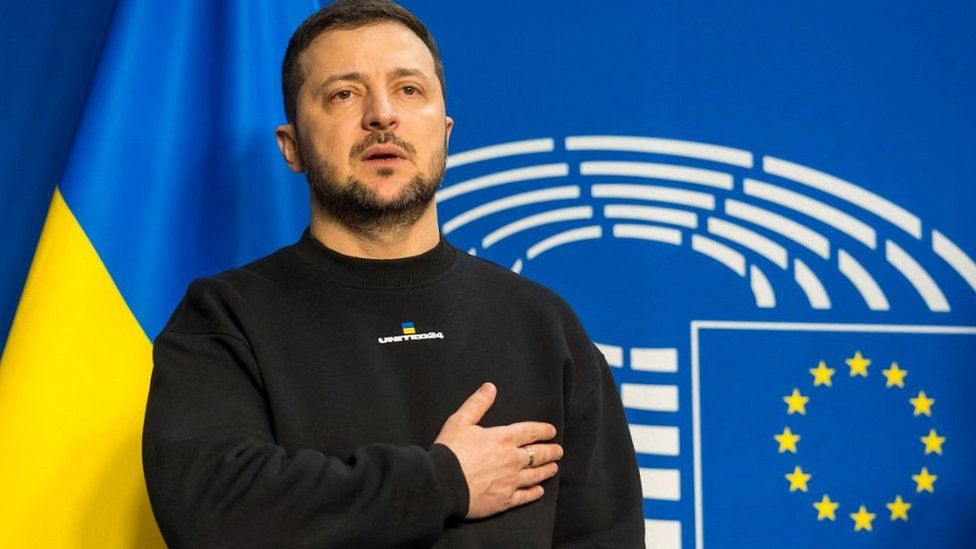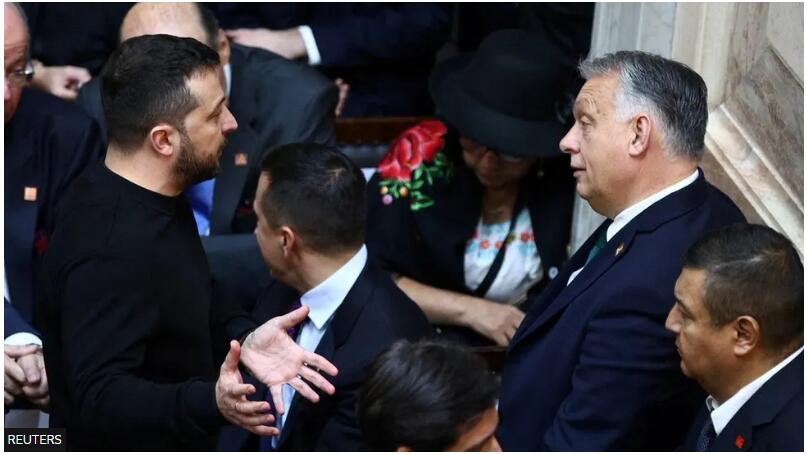Zelensky faces key tests to re-energise West’s support for Ukraine
President Volodymyr Zelensky has had a brief – but intense-looking – conversation with the man threatening to block Ukraine’s EU aspirations.
He met Hungary’s Prime Minister Viktor Orban at the inauguration of Argentina’s new president on Sunday.
Mr Orban has vocally opposed progressing Kyiv’s application to join the EU.
There are now fears that the incident could mean a diplomatic debacle later this week.
Only professional lip-readers might understand what was said between President Zelensky and a man widely seen as an EU “bad boy”.
But the exchange comes ahead of what could be a crucial week for Ukraine’s war effort.
President Zelensky will head to Washington DC on Tuesday as he seeks to rescue a $60bn (£47.9bn; €55bn) US defence aid package.
US President Joe Biden is urging lawmakers to approve the funds, but the aid has become embroiled in domestic, partisan politics.
It will be the Ukrainian leader’s second visit to the White House since Russia’s full-scale invasion of Ukraine began in February 2022 – the previous one was in September last year.
The package is currently stalled in Congress, facing pushback from Republicans who argue that more money should be going to domestic security at the US-Mexico border.
A vote in the Senate last week saw a package which included the funding blocked.
President Zelensky is also expected to hold talks with Mike Johnson, the new Republican House Speaker, during his visit to Washington.
On Thursday, EU leaders will gather in Brussels where the plan, at least, is to green-light the start of formal “accession” talks for Ukraine.
That is the next step on a very long ladder towards full EU membership, though there are no guarantees of success.
A €50bn (£43bn; $53.8bn) package of financial assistance – in loans and grants – was also due to be signed off.
However, Viktor Orban has threatened to derail both, sparking frustration in EU capitals and anger in Kyiv.

Mr Orban’s critics call him a “mouthpiece” for Vladimir Putin, having maintained ties with the Russian president despite Moscow’s decision to launch an all-out, bloody invasion of Ukraine.
Despite nodding through successive sanctions packages against Moscow, Mr Orban has also spoken out against sending more money and weapons to Ukraine.
He claims that EU chiefs are “shoving” Ukraine’s accession “down our throats” and has called for a “strategic discussion” on the bloc’s overall approach.
He has even described the aspiring member as “one of the most corrupt countries in the world”.
It is an allegation that sparks outrage in Kyiv, given Mr Orban has been accused of overseeing democratic backsliding in his own country.
Some believe Hungary’s leader is using Ukraine as a bargaining chip, to try and extract more money out of the EU.
It’s a high-stakes week for Ukraine, and officials I speak to in Kyiv say that, for now, the decision on membership talks will more deeply affect morale than EU economic assistance.
President Zelensky wrote on X, formerly Twitter, that it would have a “significant impact on the motivation of Ukrainian society and the army”.
In truth there are EU nations – aside from Hungary – who have reservations about expanding the bloc.
But according to one Brussels diplomat, it is Budapest that stands alone, for now, in holding up discussions: “It’s really a 26 versus one issue.”
